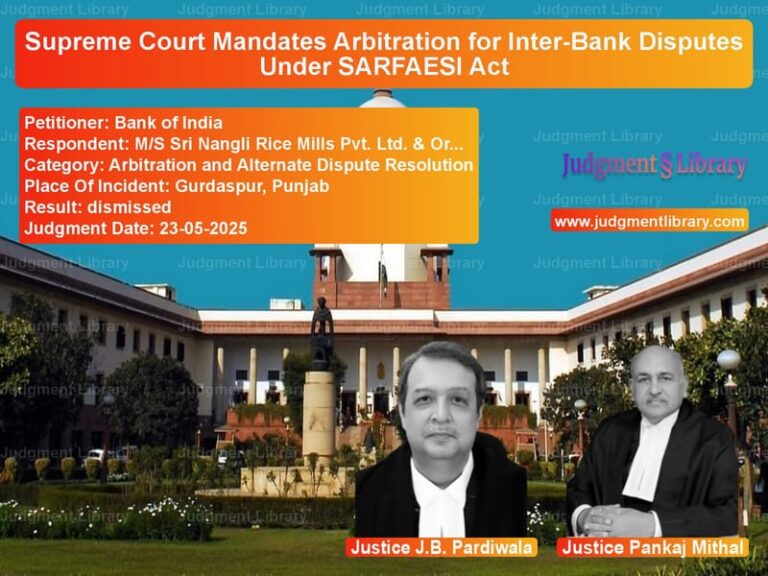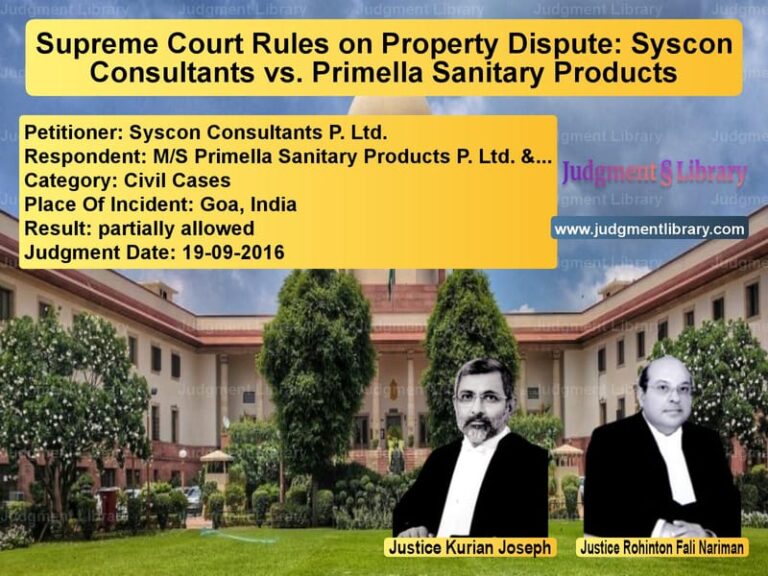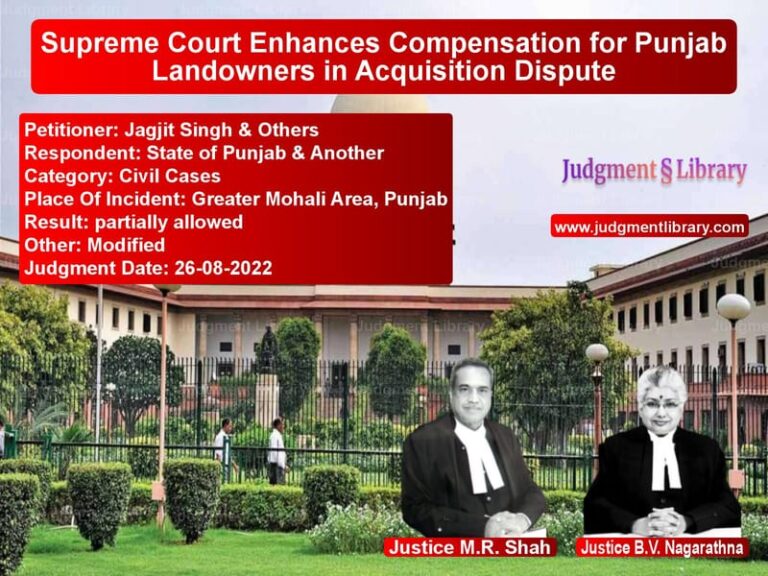Supreme Court Resolves Land Acquisition Dispute in Mumbai: A Landmark Judgment on MRTP Act
The Supreme Court of India recently settled a long-standing dispute regarding land acquisition in Mumbai under the Maharashtra Regional and Town Planning Act, 1966 (MRTP Act). The case, Satellite Developers Limited vs. State of Maharashtra & Ors., revolved around the lapsing of a reservation for public purposes and whether the land should be returned to its original owners or acquired by the government.
Background of the Case
The dispute originated from a claim over a property at Foras Road, Tardeo Division, Mumbai, measuring 10,394 sq. meters. The land was originally designated for public use under the Draft Development Plan (DDP) of 1991, which reserved portions of it for a recreation ground, a maternity home, and housing for the dishoused.
The appellant, Satellite Developers Limited, issued a purchase notice to the authorities under Section 127 of the MRTP Act, seeking either acquisition or de-reservation of the land. When no action was taken within the stipulated time, the appellant approached the Bombay High Court.
Legal Issues Raised
- Whether the reservation of land had lapsed due to the failure of authorities to acquire it within the statutory period.
- Whether the appellant was entitled to have the land de-reserved and freed from planning restrictions.
- Whether the continued efforts by the authorities to acquire the land justified denying the appellant’s claims.
Petitioner’s Arguments
Satellite Developers Limited contended:
- Under Section 127 of the MRTP Act, if land designated for public use is not acquired within 10 years and no acquisition process is initiated within six months of a purchase notice, the reservation automatically lapses.
- Despite serving the required notice on February 6, 2003, the authorities failed to complete the acquisition process within six months.
- The acquisition proceedings were unnecessarily prolonged, making the landowners suffer financial loss.
Respondent’s Arguments
The State of Maharashtra and the Municipal Corporation of Greater Mumbai argued:
- The delay in acquisition was due to procedural formalities and administrative constraints.
- A notification under Section 6 of the Land Acquisition Act, 1894, was issued in February 2004, demonstrating the government’s intent to acquire the land.
- The planning authority had already determined to use the land for the originally intended purposes.
Supreme Court’s Observations
The Supreme Court critically analyzed the arguments and found that:
“The MRTP Act clearly states that if acquisition is not initiated within the prescribed period, the reservation is deemed to have lapsed. The inaction of the authorities cannot justify depriving the landowner of their rightful claims.”
“Public authorities cannot indefinitely hold private land without completing the necessary acquisition formalities.”
The Court acknowledged that while public interest is paramount, statutory provisions must be adhered to.
Final Judgment
The Supreme Court ruled in favor of the appellant, stating:
“The reservation of the land under the Development Plan has lapsed. The land shall be deemed to be released for development as per the general zoning regulations.”
However, both parties showed a willingness to settle the matter amicably. The Municipal Corporation proposed a 70/30 formula, under which 70% of the land would be used for public purposes while the owner could develop the remaining 30%. The appellant countered with a 60/40 proposal.
The Supreme Court, invoking Article 142 of the Constitution, passed an order allowing the appellant to develop 40% of the land while handing over 60% to the Municipal Corporation.
Key Takeaways from the Judgment
- Failure to acquire land within a specified period results in the lapse of reservation.
- Authorities cannot indefinitely delay the acquisition process.
- Mutually agreeable settlements can provide solutions while balancing private ownership rights and public interest.
Implications of the Judgment
This ruling has significant implications for urban land development:
- It reinforces the rights of landowners against indefinite reservation.
- It encourages urban planning authorities to act within statutory timeframes.
- It provides a model for resolving land disputes through amicable settlements.
Conclusion
The Supreme Court’s decision in Satellite Developers Limited vs. State of Maharashtra underscores the importance of timely action in land acquisition matters. By balancing the interests of the landowners and public authorities, the judgment ensures fairness in urban development policies while upholding statutory safeguards.
Don’t miss out on the full details! Download the complete judgment in PDF format below and gain valuable insights instantly!
Download Judgment: Satellite Developers vs State of Maharashtra Supreme Court of India Judgment Dated 27-04-2017.pdf
Direct Downlaod Judgment: Direct downlaod this Judgment
See all petitions in Property Disputes
See all petitions in Specific Performance
See all petitions in Landlord-Tenant Disputes
See all petitions in Judgment by A.K. Sikri
See all petitions in Judgment by Abhay Manohar Sapre
See all petitions in allowed
See all petitions in Modified
See all petitions in supreme court of India judgments April 2017
See all petitions in 2017 judgments
See all posts in Civil Cases Category
See all allowed petitions in Civil Cases Category
See all Dismissed petitions in Civil Cases Category
See all partially allowed petitions in Civil Cases Category







